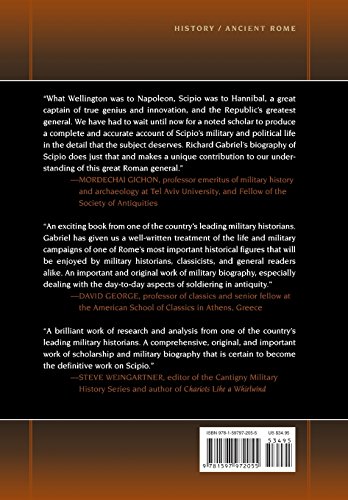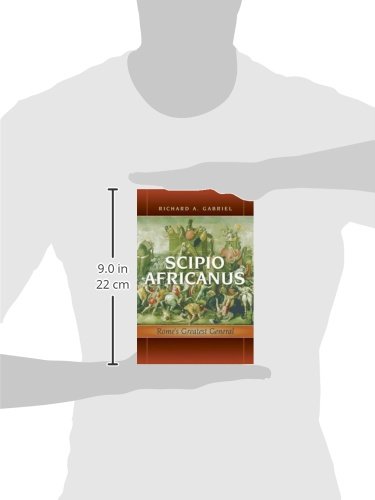Customer Services
Copyright © 2025 Desertcart Holdings Limited
Desert Online General Trading LLC
Dubai, United Arab Emirates




Full description not available
A**N
For the glory of Scipio?
Richard Gabriel is a distinguished military historian who writes well and in this book provides a wealth of information and speculation concerning Scipio. Most noteworthy are the logistical analyses, which in general are well researched and highly informative. There are some problems with this book, though, despite its overall high quality. The author tells us that a lot of the best research on the Second Punic War is in German, which fortunately he is able to read. Wunderbar, I told myself. But examining the bibliography at the end of the book I was surprised to discover several German titles rendered ungrammatically, a children's book by Donauer included as if it were a scholarly work, and the works of the top scholars of the Punic Wars publishing in German over the past few decades (Jakob Seibert, Pedro Barcelo, Karl Christ usw.) blatantly missing.Gabriel's attempts to present Scipio as a "brilliant" operational commander and "brilliant" strategist greater than Hannibal fail to convince (as do equally misguided attempts by others to portray Wellington as greater than Napoleon--Napoleon, by the way, regarded Hannibal as the greatest general of all, see the Memorial de Sainte-Helene by the Comte Emmanuel de las Cases). As the author suggests, the brilliance of a general depends on the quality of his defeated opponents, but the only great opponent Scipio ever defeated was Hannibal at Zama, a victory scored by luck and the fortunate arrival of Massinissa's cavalry at the battlefield in the nick of time (even Gabriel concedes that Hannibal had the better battle plan). To boost Scipio's credentials Gabriel claims repeatedly that the incompetent Carthaginian generals Scipio defeated in Spain were actually competent, especially the bungling Hasdrubal Gisco, surely the sorriest excuse for a commander in the Punic Wars. He credits Scipio with great military innovations, but fails to mention that he copied these from the organization of Hannibal's army, which Scipio experienced at the Roman defeats at the Ticinus, Trebbia, and Cannae. Scipio's victory at Ilipa owes more to Hannibal as a model that to any ingenuity on Scipio's part. The author even tries to credit Scipio with deriving the gladius hispaniensis from the Spanish falcata, although anyone who has held a falcata and a gladius in hand can tell they are totally different weapons. The gladius was based on a Spanish sword, but it is unlikely it was the falcata. Scipio is presented as an honorable man, and unfortunately Gabriel whitewashes his atrocities in ordering the butchery of the civilians in three cities (excusing the terrorism because "it served his strategic ends"), not to mention the scourging and beheading of his own officers after they rebelled because of lack of pay, even though he had promised them clemency if they surrendered. (Hannibal, by the way, although he fought in enemy territory for 15 years without ever being defeated, during which time he often could not pay his mercenaries, never suffered mutiny, which perhaps shows which commander was better able to inspire loyalty in his forces). Gabriel attributes Scipio's refusal to engage Hannibal in Italy to some grand strategic plan concerning Rome's future security, which supposedly demanded he be defeated in Africa, when there is a much simpler explanation, namely that Scipio was afraid he would be defeated if he faced Hannibal in Italy and needed to get him to return to Africa minus his cavalry in order to have a chance of victory. Scipio was clearly an opportunist concerned with his personal glory and refused peace overtures (even betraying the Carthaginians when he pretended to consider their very reasonable proposals, and then burning their camps in a treacherous night attack). He was willing to sacrifice countless lives (of his own soldiers and those of the enemy) in order to win a triumph for narcissistic glory. Hannibal was definitely the greater commander and the better man, a patriot who sacrificed everything for his country. The notion of his being motivated by hatred of Rome is a myth created by Roman propaganda, bent upon demonizing Hannibal and the Carthaginians. This is evident in the writings of Livy and particularly Silius Italicus, a poet and not a historian, whose versified fictions Gabriel accepts as reliable historical sources. Even among Roman generals, Marius, Sulla, Pompey, and above all Ceasar far outshine Scipio. Gabriel's claim that Caesar displayed no originality or innovation in the battlefield is belied by that brilliant defense in the siege of Alesia, to mention just one example. Gabriel's book, although in many ways a significant contribution to the field, suffers of bias in his efforts to achieve "majorem Scipionic gloriam." And as to the claim that Rome's victory over Carthage was good for posterity, the reader is urged to peruse Neil Faulkner's excellent book "Rome: Empire of the Eagles" to evaluate the destructive and predatory imperialism of Rome which can be contrasted with the tolerance of Carthaginian culture, destroyed in a frenzy of genocide and ethnic cleansing by the Romans in 146 BCE.
A**R
Lots of Great Points, Lots of Errors -- Worth the Read and Some Thought
To dispense with the hype about "Rome's Greatest General", I believe that comparisons against various opponents or other commanders at various times in history are essentially meaningless and not worth discussing. Each generally successful commander is worth some analysis and thought, and among the Romans, Scipio Africanus is worth more than most. After all, who has the time and interest to study Lucullus or Marcellus? But beyond that, who cares? Scipio never had Napoleon's problems or was forced to fight battles that extended beyond his personal sight, and arms, training, tactics and logistics vary greatly with the passage of years. Caesar, for example, seemed to face new and unknown conditions in Gaul every time he turned around. At least Scipio knew more of less what his enemy would look like and how he would be armed and would fight. The author has introduced many good points of analysis, and his maps and descriptions of Scipio's battles are far better than most. No doubt this is due to his ownership of two references I haven't seen (but would like to), namely "Antike Schlachtfelder" (Ancient Battlefields)and "Schlachten Atlas zur antiken Kriegsgeschichte" (Atlas of Battles for the Histories of Ancient Wars.) Perhaps the author can tell me where to purchase these references. It is clear that Scipio was at least mildly innovative in making the legion structure more maneuverable, but he was blessed as all Roman commanders were with dedicated troops even if they were the militia of the time. The purely professional Roman soldier was yet to come and would make his appearance in the Social Wars. Nevertheless, the Roman citizen-soldier was well trained and disciplined, and all commanders could count on a certain level of martial skill and steadfastness in whatever legions he fielded. By way of contrast, American commanders have historically suffered by having to rely on very uneven troops in all American wars from the Revolution to Korea. A commander must know his men and how to use them, and that was the outstanding trait exhibited by Daniel Morgan at Cowpens. Scipio also showed this trait, as did Hannibal to a similar degree. With respect to Zama, I have always thought it was a close-run thing in which luck played a part in addition to Hannibal having to use too many untrained troops and certainly untrained elephants. Author Gabriel does tend to cast the ancient battles under a modern microscope and impute modern motives and attitudes to ancient characters. That is a mistake in my opinion, and it is incumbent on any author of ancient history to put himself into ancient context and see ancient reality through ancient eyes and then interpret that reality and vision for the modern reader. Author Gabriel doesn't quite pull that off in this book. There are also many errors of translation from original sources, editing mistakes, inconsistencies and faulty interpretations. Ancient cavalry of course did not possess stirrups so could not break infantry formations through attacks with pikes or lances, but they could and did attack infantry with archery (remember the Parthians) and heavy cavalry using slashing swords (Alexander's Companion Cavalry.) The author indicates that the Roman cavalry rode up, dismounted, and fought on foot in spite of being lightly armoured and armed and also having to hold on to their horses. The Spanish cavalry used by the Carthaginians certainly didn't fight that way, nor have I read that the Romans did. In any case, infantry could defend itself effectively against non-archer cavalry with long pikes like those developed by Phillip and lengthened by Alexander. One must also remember that the horses in ancient times were smaller than medieval or modern horses due to the lack of fodder (oats had not been developed yet) during the winter. I recommend the prospective reader avail himself of all the reviews since most make very good points both good and bad, and then keep those points in mind while reading the book. Frankly, I liked the book and read past the problems I detected. Although the book was probably written for a general audience, it is also of value to the specialist. For contrast, the reader might also look at the work on Scipio by B. H. Liddell Hart. The writing is done well, and the author is to be commended for a valiant effort.
A**Y
Fighting for Dominion of the World
Well written and illustrated. Author uses key sources (Livy, Polybius, etc) to primarily assess the military campaigns of Scipio, before looking at his later life. Inevitably, there are speculations built on speculations, some of which I do not agree with, but that is part of the fun!I would suggest that it would be useful to know about the Second Punic War before reading this, as it would put Scipio's role in context. There should be little doubt that he is one of the greatest Generals, the army he fashioned remained one of the most effective and that he probably deserved better from Rome.
T**T
Hail the mighty conqueror of Hannibal
I have recently become interested in the history of the Punic wars & thisIs essential reading for anyone interested in this period.I found the book to be well researched & extremely well written. Of courseThere is a lot that is not recorded/ lost from this age but Professor GabrielHas taken the remaining sources & come to interesting, intelligent & logicalConclusions or assumptions where there is conjecture with the sources& justifies his reasonings very convincingly.Fantastic.
V**D
Outstanding
Very good book. The author does a very good job in reviewing both the military and political aspect of the life of Scipio. It is a fair assessment of the achievement andf failures of Scipio. I recommend it.
J**N
Good book
Really interesting..Romesgreatest general
A**R
Well worth while
Fantastically focused feature of a go getting general of Rome.Well written with sound succinct style.
Trustpilot
2 days ago
4 days ago